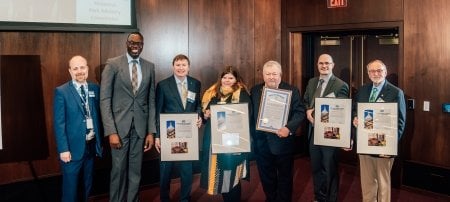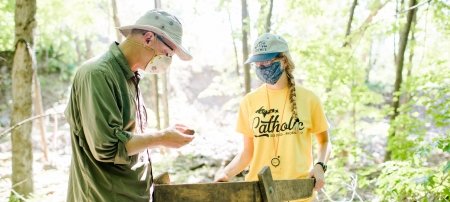Alumnus Digs Deep into St. Thomas's Past

He’s digging up the past—somewhere between 200 BC and 400 AD—in an unexpected archaeological excavation in downtown Charlotte Amalie on the Caribbean island of St. Thomas in the US Virgin Islands
David Hayes, who got his MS in Industrial Archaeology from Michigan Technological University in 2000, is principal investigator for a year-old dig that began when he noticed pottery popping out of a highway improvement site. The highway work was stopped, and the pieces have since been dated to early ceramic makers and farmers of the Saladoid era, 2000 to 1,400 years ago.
“This is a major discovery,” Hayes said. “Very rich.” In addition to the shards, he’s found animal bones, shell beads, shell bows “and a lot more, like faces in clay.”
These types of finds are rare in the Caribbean, he said.
“Commonly there are multiple cultures using the same site, and there is a mixture of the material from them, Hayes explained. “This site, for some reason, was not used much after about 500 AD, so we have a site that closed down, and the material is all from the single culture. We will be looking for the reason the people did not reuse the site later.”
He’s got a lot of help: some 25 strong, including eight highly skilled archeologists with Southeastern Archeological Research Inc. (SEARCH) from Gainesville, Fla. Another Michigan Tech grad, Alicia Valentino, who earned her Master of Science in Industrial Archaeology in 2003, is also helping on site.
“This site is so diverse that it’s almost unbelievable,” Valentino said. “The ceramic heritage that was here is fantastic. Today I found a piece of ceramic with a face on it, staring up at me from my screen.”
The team is in the second week of a three-week data recovery phase, she said, and it’s a not such a tough winter assignment. “It sure beats Seattle in January,” Valentino said of her change in domicile.
“Temperatures are from a low of 75 to a high of 88,” Hayes explained. “Some heavy rain showers that last twenty minutes, a constant breeze. No place for a snow statue!”
First they’ll be analyzing the finds, Hayes said. Then he wants to display them for public education, hopefully in a new museum on the island.
“We will be using radio carbon dating and some other methods to confirm the dates we are getting from the pottery styles,” he said. “Since this is a midden or trash heap, we are getting virtually everything. We do not have nor do we expect human remains. The pottery shards number in the thousands already.”
He said they are also getting pounds of fish bones, lots of shells.
“We cannot ID all of it in the field,” he said. “We have stone tools and beads, some made from stone that was shipped to St. Thomas.”
They have a Feb. 7 deadline, when water lines are scheduled to go into the ground and destroy the site.
“We hope to extract enough information to let us know who preceded us in this area,” he said.
And how did Hayes end up there?
“I live on St. Croix, the island I was born on,” he said. “I found Michigan Tech via the Society for Industrial Archeology [a professional organization hosted by Tech’s Department of Social Sciences]. My dad was the Chevy dealer on St. Croix. As a consulting archaeologist, I work on any of the US Virgin Islands.”
So now he’s getting to study those who originally called his home “home” long ago.
Michigan Technological University is an R1 public research university founded in 1885 in Houghton, and is home to nearly 7,500 students from more than 60 countries around the world. Consistently ranked among the best universities in the country for return on investment, Michigan's flagship technological university offers more than 120 undergraduate and graduate degree programs in science and technology, engineering, computing, forestry, business, health professions, humanities, mathematics, social sciences, and the arts. The rural campus is situated just miles from Lake Superior in Michigan's Upper Peninsula, offering year-round opportunities for outdoor adventure.




Comments